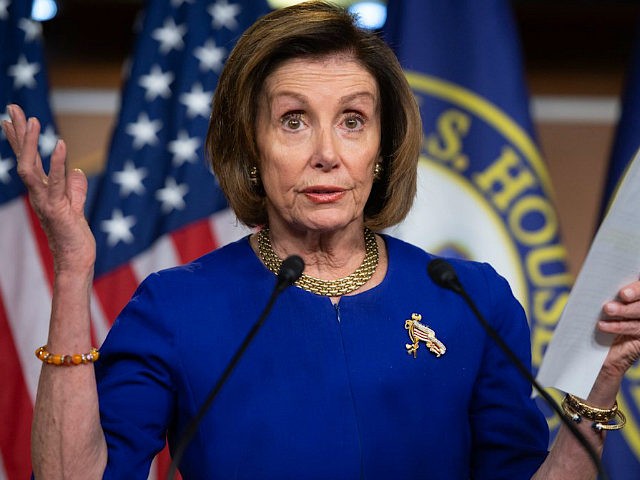
A severely weakened House Speaker Nancy Pelosi won re-election on Sunday with only 216 votes, less than a majority of 218 in the U.S. House of Representatives.
After voting concluded according to C-SPAN’s count, Pelosi had 216 votes and an emboldened House minority leader Rep. Kevin McCarthy (R-CA) secured 209 votes. Two members, both Democrats, voted for somebody else and three members—also Democrats—voted present.
The fact that Pelosi could not even get a majority of members in the U.S. House of Representatives to vote for her—since the House has 435 voting members, a majority is 218—is a sign of how much weaker she is since the 2020 congressional elections in November saw massive losses for House Democrats.
Some of the members who voted “present,” such as Rep. Abigail Spanberger (D-VA), framed their vote as against Pelosi.
But technically, Spanberger actually helped Pelosi secure the speakership by voting present. That lowered the total number of votes Pelosi needed to win, as a candidate needs to win a majority of those present and voting for a person. Members of Congress know this, and Pelosi did not actually need Spanberger’s vote in the end, but her claims to have voted for “new leadership” are dishonest as she in effect helped Pelosi secure another term. If she wanted to express opposition to Pelosi, Spanberger and the others who joined her would have actually voted for a different person.
Reps. Mikie Sherrill (D-NJ) and Elissa Slotkin (D-MI) were the other two who voted “present.”
While Republicans picked up a number of seats from Democrats, they did not secure a majority—something McCarthy is moving towards recapturing for the GOP in the upcoming 2022 midterm elections. But Pelosi’s weakness on display right off the bat in this very first vote means her hands are tied on major pieces of legislation.
While each member of the so-called “squad” did vote for her, Reps. Alexandria Ocasio-Cortez (D-NY) and Cori Bush (D-MO) withheld their votes until after the roll was called then came into the chamber to vote for her at the very end. The symbolic move seems to indicate they are the ones who put Pelosi over the top, as had they thrown in against Pelosi the San Francisco Democrat would not have had the votes she needed to win re-election.
That same dynamic will play out on partisan votes on key measures in the coming months and next two years, whether it be rule votes or on actual legislation, where Pelosi will be forced to ensure if she is trying to pass a partisan measure to make sure she has her conference locked up. She can only afford a handful of losses, strengthening not just Republicans’ hands in key negotiations but also both sides—self-proclaimed moderates and radical socialists—of the Democrat conference.
Pelosi, who is 80 years old, also worked with the U.S. Capitol’s attending physician to help certain members who were supposed to be in quarantine set up a special way for them to vote for speaker—signaling just how tight this vote was.
House Republicans mocked her for it, with one aide saying her actions amounted to turning the speakership vote into a “super spreader event” for the coronavirus pandemic and with House Administration Committee ranking emmer Rep. Rodney Davis (R-IL) comparing the odd plexiglass structure she erected to the “Popemobile.”


No comments:
Post a Comment